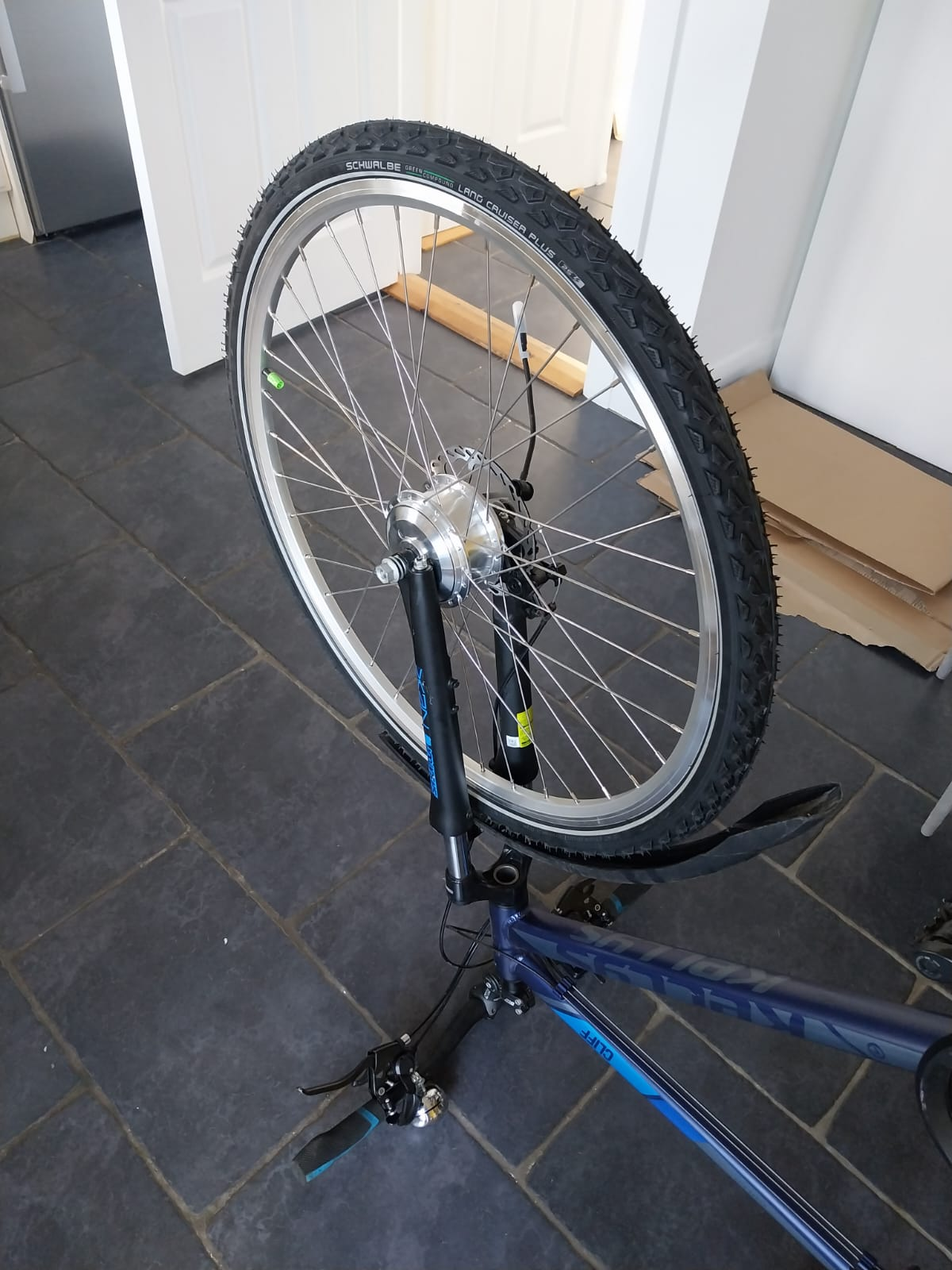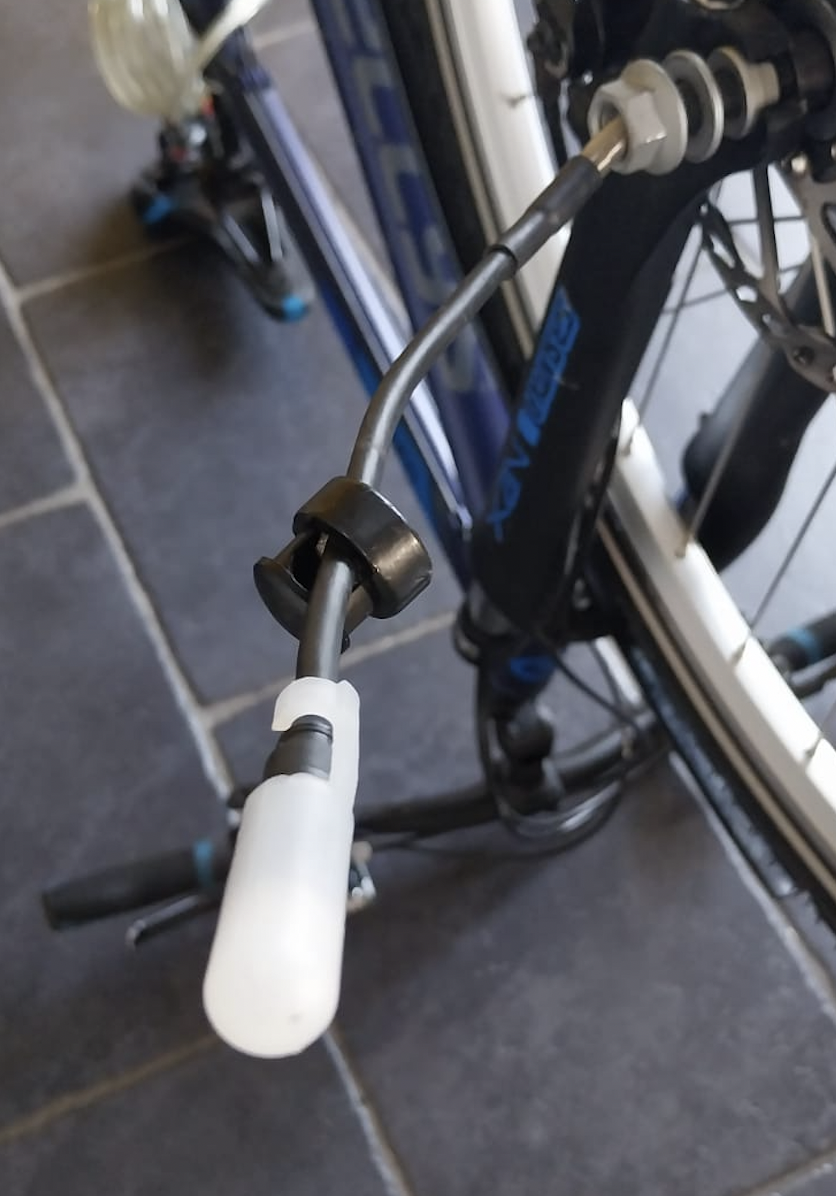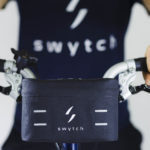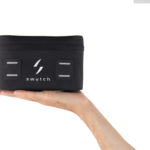Hi all,
Absolutely loving this community! I really wish I found it before I pulled the trigger on my Swytch kit last year. But, I am where I am.
I received the kit this week and frankly, I don't know what I'm doing. And after reading through countless threads here I’m a bit worried about my current options so I’d love some feedback from anyone with experience.
Basically I have the new Universal Swytch kit, and (I think) two suitable bikes.
Option 1: Kelly’s Cliff Touring Bike (Preferred)

On this one the axel fits the dropouts nicely. There is a dimple on the outside of the forks and the torque washers fit it snugly. So I’m pretty sure it doesn't hit this issue.

The problem is that even though the width between the dropouts is 100mm as required. When tightened, the shape of the fork causes it to rub against the motor on this side. In red below.

And against the disk rotor screws on the other. In green below.


I’m confident a washer inside each side of the fork will resolve the rubbing and let the wheel spin freely. But I’m concerned because the fork is already very snug without much tightening. Adding those 2 washers will expand the width of the fork, and based on a lot of threads I read on here, suspension forks are nowhere near as strong as steel/alloy forks. (This is a SR SUNTOUR NEX fork, if that helps.) So…
Question 1: Am I being overly cautious in thinking the few extra mm from 2 washers, would be too much/be a safety concern? Or should this/any suspension fork be able to handle this without issue?
Question 2: If this extra washer solution is fine. Is there any issue with using a hacked C Washer so that I can apply it directly to the axel on the wire side of the motor cable?
The cable will not fit through the plastic bolt cover to let me reorder the current washers. So my option in this case is either use a C Washer. Or else cut the plastic bolt cover, so I can remove it completely from the cable to let me reorder/add the washers. I’m guessing this is a no-no since the cover is to stop water entering the motor.

Option 2 - Fuji 1.7 Absolute Hybrid Bike
The hybrid fork is also quite snug width wise and will likely require a washer inside the fork to stop rubbing with the brake calliper but its Fuji A1 Alloy fork and not a suspension one. So the expansion doesn’t worry me here.

The problem is the dropout width is 9mm and the motor axel is 10mm wide.
Swytch’s instructions specifically say not to file anything

But when you contact support they just direct you to either join the waitlist for a new wheel with a 9mm axel, or to follow this axel filing video. Ensuring you only file the axel.
Question 3: Assuming I follow the Swytch filing video, is it fine to also file the little lip on the torque washers so it fits the 9mm dropout? Or should I look to buy ones that fit a 9mm dropout?
Question 4: The torque washer doesn’t fit into the shallow dimple in this case, so I’ll need to add a smaller washer to bridge this gap. But is it important to try match the diameter of that "filler" washer to the diameter of the dimple, or is a gap of a mm or so diameter-wise fine, once the the thickness is thick enough?

Thanks!
Absolutely loving this community! I really wish I found it before I pulled the trigger on my Swytch kit last year. But, I am where I am.
I received the kit this week and frankly, I don't know what I'm doing. And after reading through countless threads here I’m a bit worried about my current options so I’d love some feedback from anyone with experience.
Basically I have the new Universal Swytch kit, and (I think) two suitable bikes.
Option 1: Kelly’s Cliff Touring Bike (Preferred)
On this one the axel fits the dropouts nicely. There is a dimple on the outside of the forks and the torque washers fit it snugly. So I’m pretty sure it doesn't hit this issue.
The problem is that even though the width between the dropouts is 100mm as required. When tightened, the shape of the fork causes it to rub against the motor on this side. In red below.
And against the disk rotor screws on the other. In green below.
I’m confident a washer inside each side of the fork will resolve the rubbing and let the wheel spin freely. But I’m concerned because the fork is already very snug without much tightening. Adding those 2 washers will expand the width of the fork, and based on a lot of threads I read on here, suspension forks are nowhere near as strong as steel/alloy forks. (This is a SR SUNTOUR NEX fork, if that helps.) So…
Question 1: Am I being overly cautious in thinking the few extra mm from 2 washers, would be too much/be a safety concern? Or should this/any suspension fork be able to handle this without issue?
Question 2: If this extra washer solution is fine. Is there any issue with using a hacked C Washer so that I can apply it directly to the axel on the wire side of the motor cable?
The cable will not fit through the plastic bolt cover to let me reorder the current washers. So my option in this case is either use a C Washer. Or else cut the plastic bolt cover, so I can remove it completely from the cable to let me reorder/add the washers. I’m guessing this is a no-no since the cover is to stop water entering the motor.
Option 2 - Fuji 1.7 Absolute Hybrid Bike
The hybrid fork is also quite snug width wise and will likely require a washer inside the fork to stop rubbing with the brake calliper but its Fuji A1 Alloy fork and not a suspension one. So the expansion doesn’t worry me here.
The problem is the dropout width is 9mm and the motor axel is 10mm wide.
Swytch’s instructions specifically say not to file anything
But when you contact support they just direct you to either join the waitlist for a new wheel with a 9mm axel, or to follow this axel filing video. Ensuring you only file the axel.
Question 3: Assuming I follow the Swytch filing video, is it fine to also file the little lip on the torque washers so it fits the 9mm dropout? Or should I look to buy ones that fit a 9mm dropout?
Question 4: The torque washer doesn’t fit into the shallow dimple in this case, so I’ll need to add a smaller washer to bridge this gap. But is it important to try match the diameter of that "filler" washer to the diameter of the dimple, or is a gap of a mm or so diameter-wise fine, once the the thickness is thick enough?
Thanks!
Last edited:




